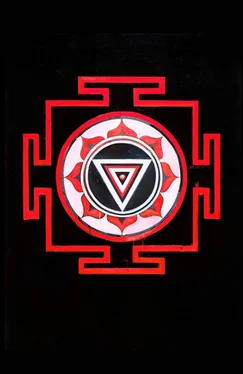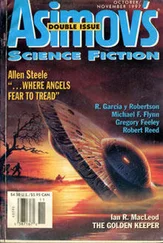‘Who the hell am I to give advice, man?’ I said. ‘Do your best, Vinson. We mess up. We all mess up. We’ll probably never stop messing up. But if we just keep doing our best, sooner or later it’s gotta be good enough for somebody. Am I right?’
‘Amen to that, brother!’ he said, slapping hands with me. ‘You know, I saw Concannon the other day. I was in Null Bazaar, visiting one of my dealers. He came in with a few guys. He was walking with a stick. It’s black, with a silver skull for a knob. Pretty cool, although I wouldn’t mind betting he’s got a sword in it.’
‘No doubt. Did he say where he was staying?’
‘No. But I heard a rumour he’s got a place way out, in Khar. But it’s only a rumour. There’s a lotta rumours floating around about that guy. He asked about you.’
‘What did he say?’
‘ Where’s the Australian convict? ’
‘What did you tell him?’
‘I said, Is that a trick question? Lucky for me, he’s got a sense of humour. I got outta there pronto, man. That guy was okay, when I met him, kinda, but now, like, a whole city isn’t far enough away.’
‘Don’t stress about Concannon. There’s a line ahead of you there.’
Idriss and Rannveig stood up. We walked around the fire to join them. Silvano was a step behind, the rifle on his shoulder.
‘You’re sure you won’t stay the night?’ Idriss asked her, holding her hands in his.
‘Thank you, sir, no. Stuart’s maid has a bad cough, and I want to be sure she is okay. She has been so kind to me, and there is no-one at home with her until we return.’
‘Very well, please give her our blessings. And come again, whenever you wish.’
She knelt to touch the earth before the teacher’s feet. Vinson shook hands amiably.
‘Thank you for your hospitality, sir,’ he said.
‘You are most welcome,’ Idriss said.
Silvano drew two young men to his side.
‘These two men are walking down now by the safer path,’ he said. ‘They will guide you, one torch in front, and one torch behind.’
‘They’ve got the plate of food for the sweet tooth spirit,’ I told her. ‘It’s wrapped in red cloth. They’ll give it to you at the base, and tell your driver where to stop. You’ll find the riverbank by torchlight.’
‘Thank you,’ she said dreamily. ‘Thank you for everything.’
They said their farewells, and walked into the darkness beyond the fire.
And I dreamed of them, that night, and a few times in the week that followed. And Didier visited my dreams, reminding me of the priorities. And Abdullah, the shadow-rider, visited dreams that raced over rooftops. And Lisa, calling to me in echoes of sorrow and remorse, hers and mine.
The world below the mountain was changing, of course, as everything does, but I couldn’t connect to it, except in those dreams. I wasn’t just physically separated from the life I’d made my own, and the people who’d become my society of friends: the mountain was my heart’s retreat from that world, and it faded in that cleaner, clearer air, only forcing its way back through visitors and dreams.
They were hard dreams. They woke me, most nights and mornings, before the sun and songbirds could ease me from sleep. And the dream-words that woke me that night were Rannveig’s, asking me about regret.
I sat up, listening to night sounds in the forest. A figure dressed in a robe as white as the stones beneath his feet walked across the courtyard of the mesa.
It was Idriss, carrying his long staff. He stopped at the edge of the clearing, where a break in the tree line gave a view of the city’s lights on the horizon.
He stood there for a while, appeasing spirits of his own, perhaps, or walking his own tightrope between attrition and contrition. Then he walked back to his cave slowly, his face drawn in sadness, and his steps quiet on the shifting stones.
Regret is a ghost of love. Regret is a nicer self that we send into the past from time to time, even though we know it’s too late to change what we said, or did. We do it because it’s human: a thing of our kind. We do it because we care, drawn by threads of shame that only fray and wither in the sea of regret.
Along the way regret, even more than love, teaches us that harm creates harm, and compassion creates compassion. And having done its work, regret fades to the nothing that all things become.
I lay back, wondering if Rannveig had placed the food beside the river on her way home from the mountain, and if the spirit she was resurrecting with remorse was free to leave her, in peace.
I saw many visitors sweat their way into the mountain camp, and glow like stones in clear water when they strolled out again. The teacher was always gentle and serene. Nothing dislodged his benign smile. Nothing interrupted his trance of patient empathy. Until, that is, he was with Silvano and me, playing cards behind the shower screen.
His equanimity capsized in the cardroom-washroom, and he swore oaths against stupidity and cursed the malignantly uninformed .
The devotees beyond the curtain could hear his tirades and cursing, but the thin sheet was enough to preserve the dignity that never failed when Idriss was in public, and the heir to their eyes.
It was a peaceful enough place: an open prison. There was no authority, and no walls but those you had to climb inside. Yet the chains that bound the devotees who lived with Idriss were no less severe.
They loved him, and couldn’t leave him without weeping distress. Mind you, he was an easy man to love.
‘Non-evolutionary knowledge,’ he said, in one of our rare, undisturbed hours, two weeks after I’d arrived on the mountain. ‘Summarise.’
‘Again, Idriss?’
‘Again, impudent intellect,’ he said, leaning close so that I could relight his joint. ‘Knowledge isn’t knowledge, until the truth of it is self-evident in the sharing. Again.’
‘Okay, in a world where apples fall from trees, it’s sufficient evolutionary knowledge to step out of the way from falling apples, or to catch one, or pick one up off the ground and eat it. All the other stuff we know, like the rate at which it falls, and the calculations that allow us to land a craft on Mars, is non-evolutionary. Not required, for evolutionary purposes. So, why do we have it? And what’s it for? Is that a fair summary?’
‘C-plus. You left out that if you extrapolate all the branches of non-evolutionary knowledge, all the sciences, arts and philosophy to their logical extremes, you get knowledge about how everything does everything.’
‘And?’
‘Well, in itself, nothing at all. At the moment, for example, based on our record here on Earth, the sciences and philosophies are giving us the means to annihilate ourselves, and most of the other species with us. So, in itself, all our knowledge means nothing. But, combined with our capacity to override our animal nature, and to express our uniquely human nature, which is a very nice nature, as it happens, it is everything.’
‘I’m not seeing it.’
‘You’re looking right at it, but you’re not seeing it. All animals have an animal nature. We have an animal nature that’s pretty close to that of bonobos, I’m glad to say, but just like bonobos do, we act like chimps when we’re under extreme stress.’
‘And that’s our animal nature?’
‘Pretty much. But unlike chimps and bonobos, we don’t always have to do that. We have the capacity to modify the way we behave. A chimp, is a chimp, is a chimp. But a human being can be anything that he or she wants to be.’
‘How, exactly?’
‘When we express our truly human nature, we create humane-human things that don’t exist in the animal world. Things like democracy, and justice. There’s no Democratic Front of Chimpanzees. There’s no Court of Justice for lions and zebras.’
Читать дальше












